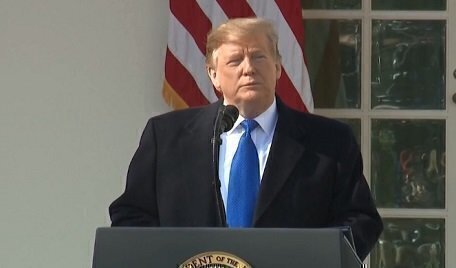A Friday morning ruling by the U.S. Court of Appeals for the D.C. Circuit could prove a watershed moment in the ongoing struggle between the White House and the House of Representatives.
 On April 15, 2019, the House Committee on Oversight and Government Reform issued a subpoena to the accounting firm Mazars USA, LLP, seeking financial documents relating to President Donald Trump, a Mazars client. President Trump sued to block the subpoena, but the D.C. District Court ruled in the House’s favor, and on Friday the D.C. Circuit upheld the decision.
On April 15, 2019, the House Committee on Oversight and Government Reform issued a subpoena to the accounting firm Mazars USA, LLP, seeking financial documents relating to President Donald Trump, a Mazars client. President Trump sued to block the subpoena, but the D.C. District Court ruled in the House’s favor, and on Friday the D.C. Circuit upheld the decision.
President Trump put forth two main arguments: first, that the subpoena was not issued in aid of Congress’s legislative authority but was instead an effort to uncover wrongdoing and even criminal activity by the President. This, he says, violates the separation of powers, because the investigation of such misconduct is an executive function and does not belong to Congress. President Trump also argued that the subpoena exceeded the Oversight Committee’s authority under House Rules, because although the Committee is expressly authorized to investigate any matter it chooses, a “clear statement” is required in order to delegate to the Committee authority to investigate the President.
Judge David Tatel’s majority opinion rejected both arguments. He traced a line of Supreme Court cases, notably those arising out of the Teapot Dome scandal during the presidency of Warren G. Harding, that stood for the principle that Congress may investigate any subject on which it might conceivably legislate, even if in doing so it uncovers wrongdoing or even criminality. Judge Tatel found that the subpoena’s avowed purpose of uncovering any potential crimes, conflicts of interest, or violations of the Foreign Emoluments Clause that might be revealed by President Trump’s financial records could inform Congress in revising the laws governing financial disclosures by presidents and presidential candidates.
If disclosures beyond those currently required would have revealed wrongdoing, that would support legislation to require additional disclosures. The House had already passed one bill, H.R. 1, that would do just that, and was considering additional proposals, including a requirement that presidential candidates release their tax returns.
As for the Committee’s authority under House Rules, Judge Tatel rejected the President’s contention that a “clear statement” was required to permit the Oversight Committee to investigate the President. Such clear statements are only necessary where the act in question would raise significant constitutional concerns or would alter the balance of power between Congress and the President; but here, the House of Representatives as a whole clearly had the power to issue this subpoena. The question of the Committee’s authority therefore did not go to the balance between legislative and executive authority but the allocation of legislative authority within Congress. This being the case, the broad statement that the Committee should review the “operations of Government activities at all levels,” and indeed investigate any matter at all, was sufficient to confer authority to investigate the President.
Judge Neomi Rao’s dissenting opinion outlined a different view of congressional oversight authority. Whereas the majority barely mentioned impeachment—and in fact did not rely on the District Court’s suggestion that the power of impeachment implies the lesser power to investigate potentially impeachable conduct—the contrast between impeachment and legislative power took center stage for Judge Rao. These two powers of Congress, she insisted, are “wholly distinct.” Impeachment, in Judge Rao’s view, is the only means by which Congress may investigate allegations of illegal conduct by the President or other officers subject to impeachment. This was demonstrated by a lengthy series of incidents from the early Republic through the Whitewater investigation into President Bill Clinton where Congress repeatedly referred questions of misconduct by executive branch officials to the Judiciary Committee or otherwise declined to pursue them outside the impeachment process.
Thus Judge Rao flipped the majority’s reasoning on its head: instead of asking first whether there was a valid legislative purpose, she asked first whether the subpoena addressed matters that could form the basis for impeachment. If so—and, as Judge Rao notes, the Committee’s justification for the subpoena rather explicitly focused on potential presidential criminality—then a potential connection to legislation would not be enough to save it. This would allow Congress to “circumvent” the impeachment process, levying allegations of misconduct against the President without following the protections of a formal impeachment inquiry.
Presumably, the White House will seek Supreme Court review of the D.C. Circuit’s ruling to the Supreme Court. If the high Court eventually hears the case, the stage would be set for a landmark ruling on the nature of congressional oversight powers. If not, Judge Tatel’s opinion could function as a key precedent for disputes between this President and this Congress. The Mazars subpoena is far from the only congressional subpoena the White House has resisted, and its arguments have been largely the same in most of these cases. Congressional Democrats had expressed their hope that the ruling in this case could make it possible to obtain swift judicial resolution of those other disputes.
Yet the relevance of today’s ruling may be somewhat diminished in light of the ongoing impeachment inquiry in the House of Representatives. Judge Rao’s opinion, after all, argues only that this kind of investigation should be pursued through the impeachment process, and that is what the House says it is now doing. Future court disputes may therefore instead hinge on questions of executive privilege, and whether the White House is entitled to resist a subpoena even if it falls within Congress’s general investigatory authority. Those questions will have to wait for another day.
Robert Black is Senior Fellow for Constitutional Content at the National Constitution Center.







